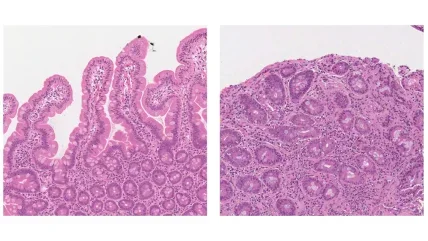
An advanced AI tool developed by researchers at the NIHR Cambridge Biomedical Campus shows promise in significantly enhancing the diagnosis of coeliac disease.
In a recently published study, the AI tool improved diagnostic processes while maintaining accuracy levels comparable to human pathologists.
The study was led by Cambridge University Hospitals’ honorary consultant pathologist and the University of Cambridge professor of diagnostics and biomarkers, Liz Soilleux.
In the study, a machine learning algorithm was trained on 4,000 biopsy images from five NHS hospitals, differentiating healthy samples and those affected by coeliac disease.
In a subsequent test involving 650 biopsies, the AI achieved an accurate diagnosis rate of more than 97% compared with the original pathologists’ diagnoses.
The AI model showed over 95% sensitivity and 98% specificity in identifying coeliac disease.
Research paper first author Florian Jaeckle said: “This is the first time AI has been shown to diagnose as accurately as an experienced pathologist whether an individual has coeliac or not.
“This is an important step towards speeding up diagnoses and freeing up pathologists’ time to focus on more complex or urgent cases.
“Our next step is to test the algorithm in a much larger clinical sample, putting us in a position to share this device with the regulator, bringing us nearer to this tool being used in the NHS.”
The study received funding from the National Institute for Health and Care Research.
In the study, the research team has engaged with patient groups, including Coeliac UK, to gauge responses to AI-assisted diagnoses.
Explainability of AI decisions has been the primary concern for patients and clinicians.
While AI can identify patterns in data, these patterns are not always easily interpretable by humans, raising questions about their relevance to the disease being diagnosed.
Ensuring that AI diagnoses are transparent and understandable is essential for obtaining approval and trust for widespread NHS use.
The AI tool has the potential to improve diagnosis in developing countries with limited access to specialist pathologists, enabling timely and accurate diagnoses.
Soilleux and Jaeckle have established a spinout company, dubbed Lyzeum, to commercialise the AI algorithm.
University of Cambridge Churchill College department of pathology professor Elizabeth Soilleux said: “Coeliac disease affects as many as one in 100 people and can cause serious illness, but getting a diagnosis is not straightforward.
“It can take many years to receive an accurate diagnosis, and at a time of intense pressures on healthcare systems, these delays are likely to continue.
“AI has the potential to speed up this process, allowing patients to receive a diagnosis faster, while at the same time taking pressure off NHS waiting lists.”






